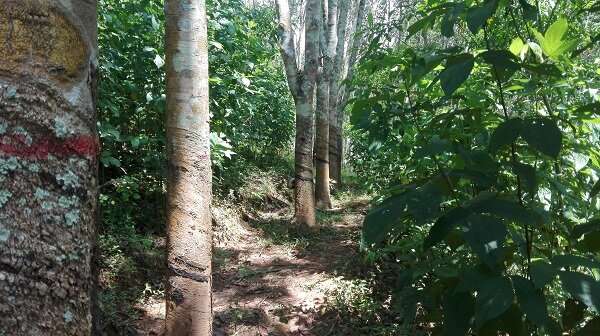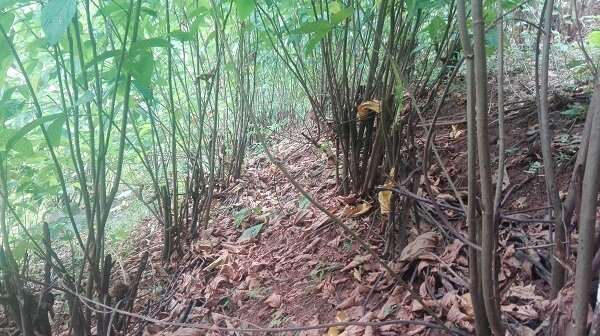by Zhang Nannan, Chinese Academy of Sciences

Rubber-Flemingia macrophylla plantation in Xishuangbanna. Credit: LIU Changan
In recent years, numerous rubber-based agroforestry systems, using a biological approach to enhance ecosystem services, have been developed. Intercropping rubber with Flemingia macrophylla, a leguminous shrub, has been widely established in rubber plantations area of China.
Previous studies showed that greenhouse gas emissions in rubber and rubber-F. macrophylla systems would be affected by their plantation age. However, the effect of different-aged rubber and rubber-F. macrophylla systems on CO2, N2O, and CH4 emissions from soils is unknown.
In a study published in Forest Ecology and Management, researchers from the Xishuangbanna Tropical Botanical Garden (XTBG) investigated the effect of introducing F. macrophylla to different-aged rubber plantations on the emissions of CO2, N2O, and CH4 in Xishuangbanna.
They found that the emissions of CO2, N2O and CH4 decreased as the trees aged in the rubber plantations. The introduction of F. macrophylla to different-aged rubber plantations significantly decreased CO2 and CH4 flux but increased N2O flux.
Furthermore, the CO2 and N2O fluxes were mainly affected by soil temperature at 10 cm depth, and CH4 flux was mainly affected by both soil water content in the 0–10 cm soil layer and soil temperature at 10 cm depth.
Moreover, they found that the rubber-leguminous shrub systems significantly improved soil organic carbon sequestration rate and reduced greenhouse gas emissions, relative to the same-aged rubber plantations.

In recent years, numerous rubber-based agroforestry systems, using a biological approach to enhance ecosystem services, have been developed. Intercropping rubber with Flemingia macrophylla, a leguminous shrub, has been widely established in rubber plantations area of China.
Previous studies showed that greenhouse gas emissions in rubber and rubber-F. macrophylla systems would be affected by their plantation age. However, the effect of different-aged rubber and rubber-F. macrophylla systems on CO2, N2O, and CH4 emissions from soils is unknown.
In a study published in Forest Ecology and Management, researchers from the Xishuangbanna Tropical Botanical Garden (XTBG) investigated the effect of introducing F. macrophylla to different-aged rubber plantations on the emissions of CO2, N2O, and CH4 in Xishuangbanna.
They found that the emissions of CO2, N2O and CH4 decreased as the trees aged in the rubber plantations. The introduction of F. macrophylla to different-aged rubber plantations significantly decreased CO2 and CH4 flux but increased N2O flux.
Furthermore, the CO2 and N2O fluxes were mainly affected by soil temperature at 10 cm depth, and CH4 flux was mainly affected by both soil water content in the 0–10 cm soil layer and soil temperature at 10 cm depth.
Moreover, they found that the rubber-leguminous shrub systems significantly improved soil organic carbon sequestration rate and reduced greenhouse gas emissions, relative to the same-aged rubber plantations.

Sloping fields in the rubber–Flemingia macrophylla plantations. Credit: LIU Changan
Decrease of CO2 emissions is crucial for the reduction of greenhouse gas emissions in rubber plantations worldwide.
"We therefore propose that rubber-leguminous shrub systems should be popularized in the rubber planting area for reducing greenhouse gas emissions," said Prof. Tang Jianwei, principal investigator of the study.
Intercrops enhance soil moisture availability in rubber agroforestry systems
More information: Xin Rao et al. Rubber-leguminous shrub systems stimulate soil N2O but reduce CO2 and CH4 emissions, Forest Ecology and Management (2020). DOI: 10.1016/j.foreco.2020.118665
Journal information: Forest Ecology and Management
Provided by Chinese Academy of Sciences
Decrease of CO2 emissions is crucial for the reduction of greenhouse gas emissions in rubber plantations worldwide.
"We therefore propose that rubber-leguminous shrub systems should be popularized in the rubber planting area for reducing greenhouse gas emissions," said Prof. Tang Jianwei, principal investigator of the study.
Intercrops enhance soil moisture availability in rubber agroforestry systems
More information: Xin Rao et al. Rubber-leguminous shrub systems stimulate soil N2O but reduce CO2 and CH4 emissions, Forest Ecology and Management (2020). DOI: 10.1016/j.foreco.2020.118665
Journal information: Forest Ecology and Management
Provided by Chinese Academy of Sciences
No comments:
Post a Comment